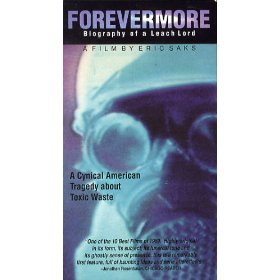From Film Comment, July-August 2001. I’m sorry that I haven’t been able to provide many illustrations for this that are tied to the films and videos discussed. Many of the ones I’ve used are drawn from earlier or later works by Saks, including paintings and photographs. — J.R.

It’s tempting to call Eric Saks’ preferred mode, in video and film alike, the pseudo-documentary — though there are times, mainly during my more apocalyptic moods, when I wonder if any other kind of American documentary currently exists. It’s less speculative to say that two of Saks’ main subjects are ecology and waste, but if you extend the meaning of those terms logically, you come up with just about the entirety of the sad American empire, President George W. Bush included.

Place Saks’ work in a drawer marked “weird stuff” or “marginal,” regardless of whether that drawer stays open or closed, and the gesture becomes the same kind of empty, self-fulfilling market judgment that his work laments — like the current functioning of national boundaries, simply a blind stab at demographics and market research rather than any valid estimation of universality. Yet Saks’ remarkable, neglected early 16mm feature Forevermore: Biography of a Leach Lord (89) and his more recent videos like Creosote and Dust breathe an everyday American desperation that we can all recognize, even when it comes wrapped (as it often does) in a literary tradition — a form of layered, weathered melancholy about American hunger that Thomas Pynchon captured perfectly (albeit in a more hippie-humanist register) on an early page of his 1966 novel The Crying of Lot 49. Read more
Here’s a piece by Serge Daney that I translated back in 1982, for a catalogue accompanying a Straub-Huillet retrospective that I curated in New York that fall. Danièle Huillet sent me the original review in French, suggesting that it be included. Too Early, Too Late, shot in 16mm, remains, for me, one of their two most beautiful landscape films, along with the much later Operai, Contadini (Workers, Peasants, 2001). — J.R.
What do John Travolta and Jean-Marie Straub have in common? A difficult question, I admit. One dances, the other doesn’t. One is a Marxist, the other isn’t. One is very well-known, the other less so. Both have their fans. Me, for instance.
However, one merely has to see their two films surface on the same day on Parisian screens in order to understand that the same worry eats away at both of them. Worry? Let’s say passion, rather — a passion for sound. I’m referring to BLOW OUT (directed by Brian DePalma) and TOO EARLY, TOO LATE (co-signed by Danièle Huillet), two good films, two magnificent soundtracks.
The cinema, you may persist in thinking, is “images and sounds”. But what if it were the reverse? What if it were “sounds and images”? Read more
From the Chicago Reader (October 13, 2006). — J.R.

Infamous **
Directed and written by Douglas McGrath
With Toby Jones, Daniel Craig, Sandra Bullock, Jeff Daniels, Peter Bogdanovich, Sigourney Weaver, and Hope Davis

Two recent features about Truman Capote, coincidentally made around the same time, concentrate on Capote’s work on his true-crime best seller In Cold Blood, about the slaying of a family in rural Kansas. Both suggest that Capote’s life and career were destroyed by the emotional strain of researching and writing that book, yet they’re fascinatingly different in what they try to do and in how they depict their subject. Capote — which professes to be based on Gerald Clarke’s standard biography of the same title — came out a year ago and won its lead actor, Philip Seymour Hoffman, an Oscar. Infamous — which claims to be based on George Plimpton’s Truman Capote, a collection of gossipy sound-bites assembled in the same manner as his “oral histories” about Edie Sedgwick and Robert F. Kennedy — was released a year after it was completed to avoid comparisons with Capote. Now that it’s out, comparisons are in order — and not all of them are to Capote‘s advantage. Read more




